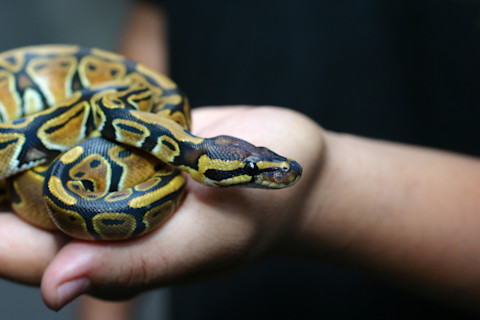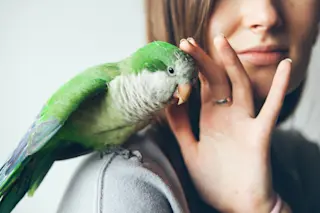For ages, humans have ridden on horses, hunted alongside dogs, and curled up with cats, big and small. Along the way, humans have also managed to make companions out of far more unusual animals — from hissing snakes to wily ferrets to even colorful, ornamental fish.
Nowadays, the exotic pet market and trade — both legal and illegal — have exploded into a multi-billion dollar industry. The U.S. alone is a major consumer, with over 11 billion animals imported into the country between the years 2000 and 2013. The drastic uptick in demand for unique animals is in part due to the proliferation of online markets, which streamline transaction processes.
But while anyone interested in owning these kinds of pets might have their own reasons, taking in any animal is no simple feat — much less an exotic pet.
Owning Exotic Pets

Ball python snake (Credit: Krisda Ponchaipulltawee/Shutterstock)
Krisda Ponchaipulltawee/Shutterstock
Certain exotic animals, like rodents and some parrots, can make suitable pets as long as owners are willing to research and meet their needs. While the pet trade is a lucrative business that poses economic benefits, researchers are arguing for an improved classification system to ensure owners are better informed about a pet’s suitability.
Mark Mitchell, vet and professor of epidemiology and zoological medicine at Louisiana State University, who has been practicing veterinary medicine for over 30 years, has owned many pets over that course and longer.
He has two 34-year-old ball pythons, about as old as his career, and tortoises approaching the same age. He’s had large dogs and backyard chickens and, at one point, even 55 fish tanks. The biggest challenge of all, he says, was providing the proper, stress-free environment to ensure they would live as long as they could.
“When I have snakes that are 34 years old, that tells me that I’m doing something right,” Mitchell says.
But what’s considered exotic is, in reality, quite subjective. It depends on where you’re from, says Jörg Mayer, a specialist in exotic animal medicine at the University of Georgia. “A guinea pig here in the United States may be considered an exotic pet, but if you go to Peru, it’s just a pet,” he says.
Typically, when we picture an exotic pet, the encompassed animals range from parrots to reptiles and amphibians to fish to small mammals, like rodents. Regardless of what kind of species they are, though, the important distinguishing factor between what’s exotic and not is the fact that these animals don’t have a long history of domestication with humans.
Exotic Animals for Companionship
Humans over the centuries have had various reasons for sparking their fascination with exotic animals in the first place. Outside of utility or services they might have offered, people also kept these animals out of a desire for companionship, showy looks and aesthetics, and even exhibition.
In Europe, more and more private individuals began collecting exotic animals starting in the early 18th Century – to the point where the wealthy could amass entire estates of animals.
Today, our menageries range from furry and scaly friends to even invertebrates like giant spiders. Some people, Mitchell says, view these animals as novelties, while others take to them out of curiosity.
“[The] human-animal bond is not limited to furry things,” he says.
Read More: Why These 6 Animals Shouldn't Be Domesticated
Caring for Long-Living Species

Tortoise (Credit: Juice Verve/Shutterstock)
Juice Verve/Shutterstock
Before adopting an exotic pet however, there’s a plethora of considerations to take into account. Some species, like tortoises and parrots, for example, live far longer than conventional domesticated pets, meaning taking them in might even become a lifelong commitment.
When thinking of adopting a puppy or a tarantula, Mitchell adds that it's important to do homework ahead of time. It isn’t necessarily that being interested in exotic pets is harmful, per se, but rather that it's better to know what you’re getting into before signing that final form.
“Exotic pets are not something that should ever be purchased as a novelty because they have a real commitment associated with them,” Mitchell says, adding that fostering or adopting animals from rescues, where they’ve been relinquished by previous households, is an option for prospective owners (rather than buying them from stores).
Resources to provide for these exotic animals also aren’t as readily varied or available as those developed for domesticated breeds.
“There’s dog food for the puppy, there’s dog food for the older dog, there’s dog food for the one that has inflammatory bowel disease that can’t digest stuff. There’s a plethora of dog food – same with cat food,” says Mayer. “And then, we have…bird food.”
Replicating Natural Habitats
Knowing how an animal lives in the wild may include what kind of food it eats over a lifetime, where it originally came from, and what the climate and humidity levels are like in its natural habitats.
“If you’re not 100 percent sure how that animal lives in the wild, you’re going to have a very, very high likelihood to somehow cause a disease, with inappropriate settings in captivity,” Mayer says.
Mayer says that by the time these problems present, it’s often too late or difficult to treat or reverse them. Replicating an animal’s natural habitat and living conditions as accurately as possible within your own home is key to keeping them healthy.
“Is it a cockatoo that actually has an outside aviary and flies every day…or is it a couch potato cockatoo that literally just sits in the cage and watches the Bachelorette finale with the owner?” Mayer says.
Knowing how to provide an animal the life it might lead in the wild before carrying it past your doorstep is the best kind of medicine.
“I always say, if you want to be a really good exotic animal veterinarian, you are a specialist in preventative medicine,” says Mayer. “You have to prevent the problem. How do we prevent the problem? We’ll teach the owners. We educate the owners on how to keep them at home safely.”
Read More: Why These 6 Animals Shouldn't Be Domesticated
Should Humans Keep Exotic Pets?
One argument frequently raised against keeping exotic pets is the fact that conditions in captivity can threaten their welfare. Indeed, the surge in interest and demand for exotic pets has come with many drawbacks.
Animals often face multiple threats to their well-being during harvest and transport. Trafficking risks decimating the native populations of certain species, contributing to their potential endangerment and even extinction.
Even after arriving at their final destinations, owners who may be ill-equipped to care for them long-term might end up giving them up to shelters or releasing them into the wild. Scientists have traced such releases as the reason behind the recent influx worldwide of invasive species.
So, is it worth keeping exotic pets at all, despite their long histories with humans? Finding a straightforward answer is tricky, especially when not even domesticated animals like dogs and cats receive proper treatment all the time.
Read More: Are Japan's Animal Cafes a Bad Idea?
Article Sources
Our writers at Discovermagazine.com use peer-reviewed studies and high-quality sources for our articles, and our editors review for scientific accuracy and editorial standards. Review the sources used below for this article:
Jörg Mayer. Specialist in exotic animal medicine at the University of Georgia
Mark Mitchell. Vet and professor of epidemiology and zoological medicine at Louisiana State University
Manual of Exotic Pet Practice. Chapter 1: History of Exotic Pets
The Guardian. Animal travellers: a history of exotic animals in the UK – in pictures
Frontiers in Ecology and Environment. When pets become pests: the role of the exotic pet trade in producing invasive vertebrate animals
Animals: an open access journal from MDPI. ExNOTic: Should We Be Keeping Exotic Pets?
J Agric Environ Ethics. Assigning Degrees of Ease or Difficulty for Pet Animal Maintenance: The EMODE System Concept















